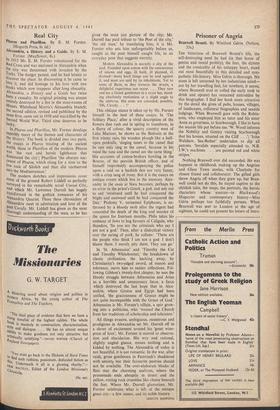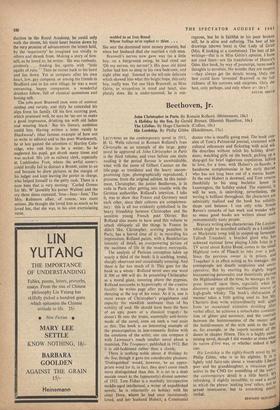Prisoner of Angria
Tan bitterness of Branwell Brontd's life, the self-destroying need he had (in that home of genius and moral probity), the fear, the slyness and the comicality of his unhappy heart, stand out most beautifully in this detailed and sym- pathetic life-history. Miss Gerin is thorough. No stone is left unturned by her industrious mind— nor by her travelling feet, for nowhere, it seems, where Bra nwell trod or rolled (he early took to drink and opium) has remained untrodden by this biographer. I find her book more attractive by the detail she gives of pubs, houses, villages, of landscapes, collateral biographies and seaside lodgings. When Branwell goes with the Robin- sons, who employed him as tutor and his sister Anne as governess, to Scarborough, I like to have the seaside life put before me. `W. Wood informs the Nobility and Gentry visiting Scarborough that his houses, situated on the Cliff . . .'; 'John Walshaw, Sea-Bather' undertakes to dip all patrons. `Invalids especially attended to. N.B. J.W.'s machines . . are painted red and white stripes.'
Nothing Branwell ever did succeeded. He was happiest in childhood, making up the Angrian and Glass Town stories, with Charlotte for closest friend and collaborator. The gifted girls threw Angria off when they grew up, but Bran- well could not do this, he stayed captive to the childish tales, the maps, the portraits, the heroic characters whose sources—in Blackwood's Magazine and contemporary history—Miss Gain perhaps too faithfully pursues. When Branwell was sent to London at the age of eighteen, he could not present his letters of intro- duction to the Royal Academy, be could only walk the streets, his timid heart beaten down by the very promise of advancement the letters held, by the 'superiority' he imagined too vividly in others and shrank from. Making a story of him- self, as he loved to, he writes: 'He was restlessly, aimlessly . . feeding his spirits with "little squibs of rum. " Then he comes back to his hotel and lies down Yet in company after his own heart, low, gay company, or among his friends in Bradford and in his own village, he was a most entrancing, happy companion. a wonderful drunken fellow, full of classical quotations and boxing talk.
The jobs poor Branwell took were of comical mishap and variety, and slyly he concealed his slips from his family. Of his first tutoring post, _which promised well, he says he 'set out to make a good impression, drinking tea with old ladies and wearing black.' But his literary ambition undid him. Having written a letter vainly to Blackwood's (that famous example of how not to write to editors) and to the poet Wordsworth, he at last gained the attention o: Hartley Cole- ridge, who told him to be a writer. So he neglected his pupil, got drunk many times and was sacked. His job as railway clerk, especially at Luddenden Foot, where the awful scenery could hardly fail to distract a Brontë, cantle to an end because he drew pictures in the margin of his ledger and kept leaving the porter in charge, who helped himself to the petty cash. There is a note here that is very moving: 'Curled Greens for Mr. W' (possibly his porter Walton) and the cry three times repeated, 'lest[—Jesu—Jesu.' The Mrs. Robinson affair, of course, was more serious. He thought she loved him as much as he loved her, that she was, in his own excruciating verse,
wedded to an Iron Breast Whose feelings ne'er replied tc thine. . .
She sent the dismissed tutor money presents, but when her husband died she married a rich man.
Branwell's nerves now gave way (as a little boy, on a fairground swing, he had cried out 'Oh my nerves, my nerves!'). His poor old blind father had him to sleep in his own bedroom, and night after nigl listened to the tell-tale delirium which showed him what this bright hope, this only boy, really was. Yet one likes Branwell, as Miss Gerin, so scrupulous in mind and heart, also plainly does. He is under-talented, he is out- rageous, but he is faithful to his poor broken self, he is alive and suffering. The best of his drawings (shown here) is Our Lady of Grief (Mrs. R looking at a tombstone). The best of his writings—this' is in Miss Gerin's opinion. I have not read them—are his translations of Horace's Odes. Her book, by way of postscript, turns one's thoughts to novelists. No wonder they are suspect —they always get the details wrong. Only the best could have 'invented' Branwell in the full richness of his sorrows and surprises. Only the best, only perhaps, and only where at-. they?
SI EVLE SMITH



































 Previous page
Previous page